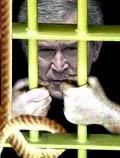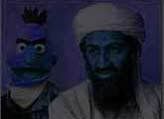| Find |
Saturday, 3 January 2009
Time to overthrow the Arab Beasts
Egyptian complicity in Israel's Gaza bloodbath is giving fresh impetus to struggles against the Mubarak and Saudi regimes Doublespeak absurdity is plentiful at the moment; I thought I'd had more than my fair share of it in the West Bank this week, watching Israel's brazen PR zealots deliver soundbite after soundbite into television cameras, each of them notable only for their heart-stopping audacity. But that was before I returned to Cairo to hear the Mubarak government's breathtaking contortions as it tried to justify its complicity in Israel's Gazan bloodbath.
Doublespeak absurdity is plentiful at the moment; I thought I'd had more than my fair share of it in the West Bank this week, watching Israel's brazen PR zealots deliver soundbite after soundbite into television cameras, each of them notable only for their heart-stopping audacity. But that was before I returned to Cairo to hear the Mubarak government's breathtaking contortions as it tried to justify its complicity in Israel's Gazan bloodbath.
The pages of Egypt's state-owned newspapers are an inky testament to George Orwell's claim that "Political language ... is designed to make lies sound truthful and murder respectable, and to give an appearance of solidity to pure wind." A few brief examples:
• Israeli foreign minister Tzipi Livni visits President Mubarak on the eve of the military offensive to secure his approval; her Egyptian counterpart claims that Mubarak had got wind of what was about to happen and had summoned "that woman" to Cairo to persuade her to stop the attack.
• Egypt leaves the Rafah border largely sealed as bombs fall on Gazans, citing in its defence an expired treaty to which it is not even a signatory; government spokesmen insist that Egypt is acting in the Palestinian national interest by thwarting Israel's plan to annex Gaza to its Arab neighbour.
• Protecting his own fast-melting political skin, Mubarak spends months helping to isolate Hamas and maintains a brutal crackdown on its Egyptian colleagues, the outlawed Muslim Brotherhood; as Israeli missiles seek out Hamas targets, he keeps a straight face while telling the Egyptian people that Zionist leaders have blood on their hands and that the Palestinians must stand united.
Orwell also said that "During times of universal deceit, telling the truth becomes a revolutionary act." When deceit is so pervasive though, it's hard to know where to begin the revolution. One good place to start is the prism through which Egypt's role in the Gazan mess is viewed by the domestic and international media. It's a prism that distorts and misdirects, both masking and deepening the most important dividing line in the Middle East today ¬– the one between neoliberal regimes and their people.
Egypt's beleaguered politicians have come under sustained fire since the Gazan assault began, and are smarting from the verbal volleys. Hassan Nasrallah's call on the Egyptian masses to rise up in their millions to force open the Rafah border gate received short shrift from Mubarak minister Aboul Gheit, who told the Hizbullah leader that his country's armed forces were ready, if necessary, "to protect Egypt from people like you". More
Posted at
19:22
![]()
Post Title: Time to overthrow the Arab Beasts
![[Zionazis-1.jpg]](https://blogger.googleusercontent.com/img/b/R29vZ2xl/AVvXsEg_x8DOGucgHQmfJJujuK_oYJdxhEnskhQqt-Og7lSk52HeaDQYzW8NQWfdpHmPgj_FJN0jJ3tz1prR1jVZHdHky2HDQxxcs4LVxX0DtAt3fG0sfRr6MDx7Sz8cJNjl0k0RS9TbCjangQ/s1600/Zionazis-1.jpg)




